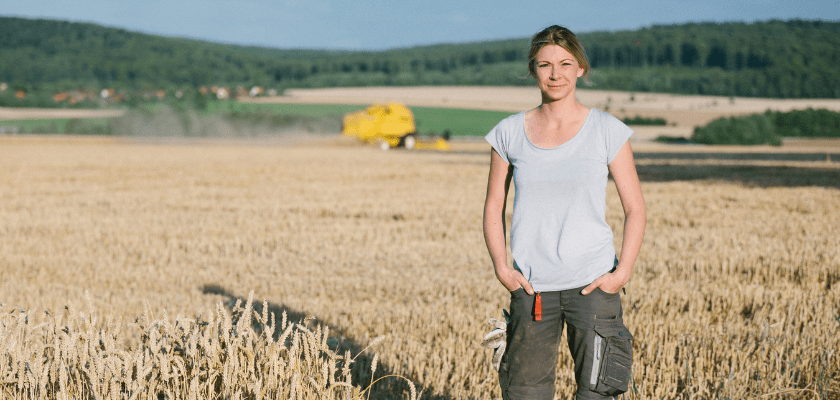Prevent runovers on your grain farm with these 6 expert tips

Farmers are generally a very close and cohesive group. When you work on a farm, you are often working with your friends, neighbours, or family members. If one of them were to suffer a critical or fatal injury from being run over by a vehicle or heavy equipment, it would be devastating.
“Despite everything we know about how to prevent runovers, they still happen,” says Ryan Dick, Health and Safety Consultant with WSPS. “Whether it’s a truck, tractor, combine, trailer, or wagon, if one of them runs over a worker, it’s a life-altering event for everyone on the farm.”
Ryan highlights that unsecured loads can also lead to a critical or fatal injury if they run over or strike a worker. “A farm owner was killed about 18 months ago when a tractor experienced a mechanical failure, rolled over, and a loose hay bale from the load crushed them,” Ryan says sadly. “It’s very important to securely strap-down loads.”
Another reason to ensure loads are securely strapped down is to prevent situations that would require the driver to get out of the vehicle while on the highway. “If something comes loose and falls off the vehicle, the driver is likely going to stop and try to fix it,” says Ryan. “This is a risk because other drivers are not expecting someone to be walking around on the side of a highway. It may be difficult to see you, especially when stepping out from between equipment.”
One seat, one rider
“If you’re not sitting properly in a seat, you should not be on the vehicle,” says Ryan as he explains that extra riders falling off equipment is still one of the leading causes of runovers on farms. He’s referring to scenarios such as when a worker hitches a ride to the other end of the field on the tractor steps or on the fender. “When people do this, they are asking for disaster,” says Ryan—especially when you factor in fatigue after long hours and lower visibility when working at night.
Ryan also advises farm operators to train workers to check vehicles and equipment for kids before they start moving. “When we’re talking about a family-owned farm, it’s common for kids to climb into gravity wagons or jump into the tractor cab,” says Ryan. It’s best to keep children away from equipment and vehicles. However, as a precaution, it’s a good idea to make your workers aware of the possibility of children being around. Train them to confirm that no one is unexpectedly trying to hitch a ride.
Follow these 6 tips to prevent runovers
In addition to the advice above, Ryan offers these tips to prevent farm workers from being run over or struck by vehicles and equipment.
- Know who is on the farm and where they are. “If you can’t see someone, don’t assume they must have left the area,” cautions Ryan. “Blind spots on these types of vehicles are huge.” Make sure everyone is accounted for before you start driving equipment or vehicles. Establish a method of communication (e.g., eye contact, hand signals) and train workers so that everyone is on the same page. “Having your employees wear high-visibility vests when working out in the fields is a good idea,” says Ryan.
- Clean, inspect and test regularly. Most vehicles are equipped with lights, sensors, and back-up cameras. When used, these features are very effective tools to prevent runovers because they improve visibility and remind others in the area that the vehicle is moving. Train workers to inspect, maintain, and use these features and to regularly clean dirt and dust from windows and cameras.
- Establish driving routes. Where possible, establish designated driving routes for tractors and trailers that do not require backing up. Keep these driving routes separate from work areas where others are walking.
- Ensure drivers adjust for the weight of full vs. empty gravity wagons. “Knowing the weight limits and how that weight will affect stopping distances and turning distances is important for drivers,” says Ryan. Ensure that everyone on the farm understands how the weight of full gravity wagons impacts stopping and turning, as well as how easily they can tip over and strike a worker.
- Secure chocking when loading and unloading. “When workers are loading and unloading trucks or trailers, there’s a risk of being runover,” points out Ryan. “This is why chocking is so important.” Make sure blocks are securely in place to prevent the vehicle from moving unintentionally as the load shifts while workers are loading or unloading grain or straw.
- Avoid backing up when hitching. “Backing up a vehicle while someone else is behind it trying to hitch a wagon is how many runovers happen,” says Ryan. “Back the hitch past the wagon tongue, then select a slow forward gear to creep in while the draw pin is secured,” says Ryan. He suggests looking into quick-hitch products as well to eliminate the risk of runovers while hitching.
How WSPS can help
Consulting
Connect with a WSPS health and safety expert for help with developing effective policies and procedures
Training
- Tractor Safety (eCourse, 1 hour)
- JHSC Certification Training Part 2 – Agriculture (online, instructor-led, 2 days)
Resources
- Agriculture Safety—Struck-By Accidents (tooklit)
- Hazard Assessments for Agriculture (video)
- Agriculture and Horticulture—Stay Focused, Stay Safe (toolkit)
- Small Business Checklist (1-5 employees) Agriculture
- Preventing Machine Hazards – Agriculture (toolkit)
- Health and Safety Orientation Handbook Generator
The information in this article is accurate as of its publication date.




